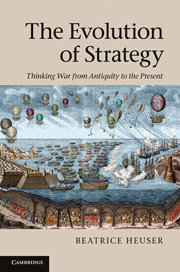Book contents
- Frontmatter
- Contents
- Acknowledgements
- A note on referencing
- Part I Introduction
- PART II Long-term constants
- PART III The Napoleonic paradigm and Total War
- PART IV Naval and maritime Strategy
- PART V Air Power and nuclear Strategy
- PART VI Asymmetric or ‘small’ wars
- 15 From partisan warfare to people’s war
- 16 Counterinsurgency
- PART VII The quest for new paradigms after the World Wars
- Bibliography
- Index
16 - Counterinsurgency
from PART VI - Asymmetric or ‘small’ wars
Published online by Cambridge University Press: 05 June 2012
- Frontmatter
- Contents
- Acknowledgements
- A note on referencing
- Part I Introduction
- PART II Long-term constants
- PART III The Napoleonic paradigm and Total War
- PART IV Naval and maritime Strategy
- PART V Air Power and nuclear Strategy
- PART VI Asymmetric or ‘small’ wars
- 15 From partisan warfare to people’s war
- 16 Counterinsurgency
- PART VII The quest for new paradigms after the World Wars
- Bibliography
- Index
Summary
As a general rule the quelling of rebellion in distant colonies means protracted, thankless, invertebrate war … It is a singular feature of small wars that from the point of view of strategy the regular forces are upon the whole at a distinct disadvantage as compared to their antagonists.
(Callwell 1896/1906: 27, 85)This is not the sort of struggle where you take a hill, plant the flag and go home with a victory parade … It’s not war with a simple slogan.
(General David Petraeus, 11 September 2008)The legal status of insurgents
Lucifer, the rebel angel, was expelled from Heaven by an angry God, and throughout its history, Christianity has treated rebellion against legitimate authority not only as an offence but as a capital crime. Insurgents threaten the very power structure of society. This is why medieval monarchs resorted to such brutal repression, and why insurgents were customarily treated so much more harshly if captured than regular soldiers. Grotius took great pains to emphasise that subjects had to accept injury inflicted upon them by rulers for the sake of not bringing instability to the society as a whole. Yet he argued that a prince issuing a command directly contrary to the law of God could be disobeyed, likewise a prince encroaching upon the rights of other parts of the government, such as a parliament (‘Senate’), or the territory of another (Grotius 1625, I: 4). This could be seen as a legitimisation of the ‘people’s war’ of resistance against an invasion force, once a regular army is defeated by the invaders, but had no lasting impact on international law.
Few civilisations, confronted with insurgents rebelling against what was perceived on the other side as legitimate authority, took them prisoner; most killed them out of hand. An attempt to change this was made in the American Civil War, where both sides had irregulars fighting for them. In 1863, Order 100 or the ‘Lieber Code’ was created among other things to stop summary executions of partisans upon their arrest. Henceforth, there was – in theory – to be no legal distinction between regular and irregular soldiers, and irregulars were to be given the same protection from martial law as regulars – including the right to a military trial (Beckett 2001: 30). But no international consensus on this point could be found, not least as by definition, irregulars also tended to break the ius in bello themselves: generally, they would not wear recognisable uniforms or other outward signs of being combatants, precisely so that they could pass as civilians and be able to hide more easily among the civilian population. Central to insurgencies is their illegality or semi-legality. The Hague Convention of 1899 struggled with this issue, but without a satisfactory result. So guerrilla fighters continued to be hunted down and, more often than not, killed immediately or after tortuous interrogation.
- Type
- Chapter
- Information
- The Evolution of StrategyThinking War from Antiquity to the Present, pp. 419 - 438Publisher: Cambridge University PressPrint publication year: 2010



